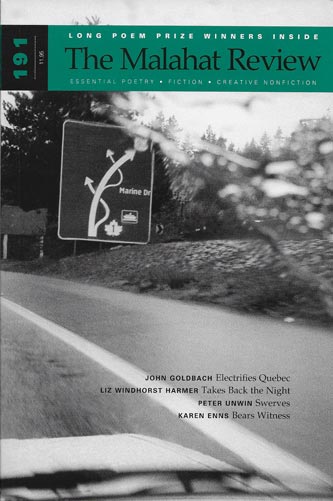The Malahat Review – Summer 2015
The Malahat Review has published their $1000 Long Poem Contest winners, and boy are they long, and powerful. Gary Geddes’ 18-page persona poem “The Resumption of Play” gives a post-modern kaleidoscope view of a First Nations boy’s brutal kidnapping into one of the residential schools that blights a chapter of Canadian History with shame. With lines such as, “Kill the Indian in the child was Scott’s / ’final solution.’ Remove parents, culture, language, replace them with perverts, / sociopaths,” Geddes pulls no punches. The Malahat Review has published their $1000 Long Poem Contest winners, and boy are they long, and powerful. Gary Geddes’ 18-page persona poem “The Resumption of Play” gives a post-modern kaleidoscope view of a First Nations boy’s brutal kidnapping into one of the residential schools that blights a chapter of Canadian History with shame. With lines such as, “Kill the Indian in the child was Scott’s / ’final solution.’ Remove parents, culture, language, replace them with perverts, / sociopaths,” Geddes pulls no punches. And kudos to the judges for choosing such brave writing. Co-winner, Genevieve Lehr’s long poem “The latter half of the third quarter of the waning moon” is as twisting and turning as its $1000 title. Her economic language blended with intimate imagery, for example, “In the quarter-light, the cat’s face is the crosshatch / on a flowerpot, dark orthography.” or “Everything is a gift. Daughter, I say, what’s yours / is yours: the wind in your hair,” perhaps made the judges’ decisions easier.
Although the two Long Poem winners are the meat and potatoes of this issue of Malahat well-served summer offering, they are by no means the whole meal. Two fiction pieces, “In This Apartment” by Carla K. Stewart and “The Truth of Our Theories” by Liz Windhorst Harmer, explore themes underpinning violence against women while stacking the narratives against the lighter theme of youthful relationships. Both stories are insightful, tender, and deliver glimpses into intimate workings of a Canadian woman’s mind. On a different plate, John Goldbach’s hardboiled history driven narrative “Sigismund Mohr: The Man Who Brought Electricity to Quebec” could not be more of a contrast. His story reads like a fictionalized Oliver Sacks case study about an early Jewish pioneer, who dies after catching pneumonia while trying to restore power to Quebec City in the middle of a snowstorm.
The only creative nonfiction dish served is “Greenland” by Russian author Anzehelina Polonskaya, and translated by Andrew Wachtel, a stark inner meditation on cold, with stellar lines like, “There are only two things that you must get inured to in this life: cold and lust.” Although not written from a Canadian perspective, the Idea of North is clearly present and one has to wonder if that is what seduced the editors to publish it. At times “Greenland” feels like a thin sheet of ice over a frozen lake ready to crack open, but it never warms enough to melt.
There are eight short poems spread throughout the offering. Vincent Colistro’s “Bus” captures the zeitgeist of modern urban living. “Bus” opens with, “I bought a bus pass from the Middle Eastern grocer on Fort Street / and some pomegranate extract and rosewater and Macedonian feta,” and the ride ends across town with, “When they said why can’t you be a proper mystic, take three square / meals a day, keep your miracles modest, she replied: ‘I won’t cave.’” Coistro hits the nail on the head several times throughout the poem.
The dessert selection contains 11 book reviews, spread almost equally across the genres, all Canadian writers and presses, which is completely understandable as The Malahat Review receives financial support from the Canada Arts Council, the British Colombia Arts Council, and The University of Victoria. I imagine they have a few restrictive content laws to be annually eligible. Nevertheless, Judy LeBlanc’s review of Deborah Roig’s third collection of short stories Brilliant makes me want to order it right now, or buy a flight to Abu Dhabi, where the collection is set.
Although 80% of the contributors are Canadian, mostly from the West Coast, and almost all mid-career with plenty of publishing credits, there is an international feel and awareness that underlines the editorial choices. The Review flows smoothly, with flawless design and clear thought to content placement. The Malahat Review is professional, intelligent and entertaining. If I were a Michelin reviewer, I would not think twice before awarding this tasty offering a well-deserved third star. I also look forward to gobbling down their next issue, to see if they deserve a fourth-star.
[www.malahatreview.ca]





